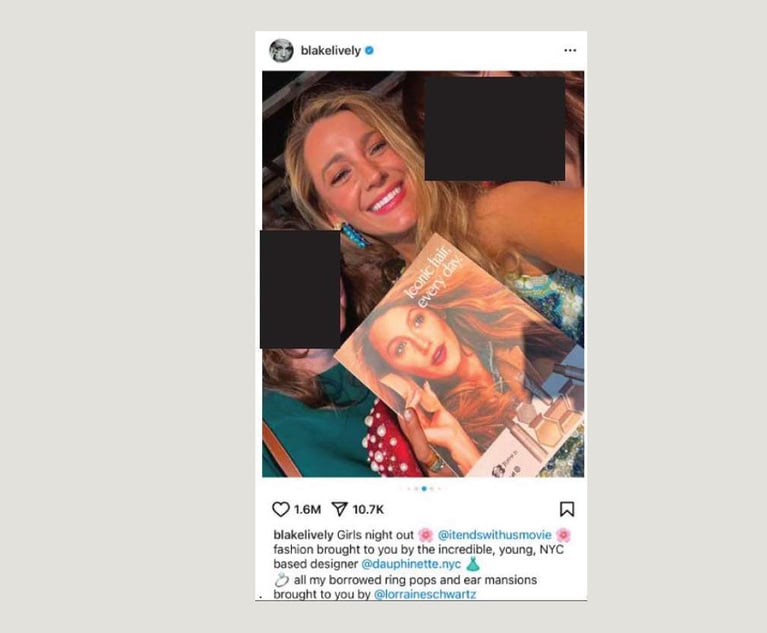Chhabria Blesses Monsanto's Move to Bifurcate Upcoming Roundup Trials
In an unusual move, U.S. District Judge Vince Chhabria in San Francisco bifurcated the first bellwether trials in the multidistrict litigation over the herbicide Roundup, the first of which starts next month.
January 04, 2019 at 04:29 PM
5 minute read
 RoundUp weed killer.
RoundUp weed killer.
In a big win for Monsanto Co., a federal judge in San Francisco has bifurcated the first bellwether trials in the multidistrict litigation over the herbicide Roundup, the first of which starts next month.
U.S. District Judge Vince Chhabria of the Northern District of California ruled Thursday that three upcoming trials would each have two phases. The first would focus on whether Roundup's key ingredient, glyphosate, caused a plaintiff's diagnosis of non-Hodgkin's lymphoma and, if so, how much the jury should award in compensatory damages. The second, if needed, would address Monsanto's liability and punitive damages.
Monsanto, which sought so-called “reverse bifurcation” of the trials, argued that juror confusion over conflicting regulatory findings led to last year's $289 million verdict in San Francisco Superior Court. Bifurcating the trial could potentially stymie a key trial theme from the plaintiffs' legal team: That Monsanto influenced the scientific studies backing the safety of glyphosate.
“Although this type of bifurcation is unusual and should be done with caution—both generally and in the context of MDL bellwether trials—it is warranted here,” Chhabria wrote in his decision. “A significant portion of the plaintiffs' case involves attacks on Monsanto for attempting to influence regulatory agencies and manipulate public opinion regarding glyphosate. These issues are relevant to punitive damages and some liability questions. But when it comes to whether glyphosate caused a plaintiff's NHL, these issues are mostly a distraction, and a significant one at that.”
Chhabria heard arguments on his order at a hearing Friday.
The move is the latest by Monsanto to prevent a repeat of last year's verdict, later lowered to $78.5 million, as it gears up for the first trials in federal court. Last month, Monsanto raised concerns about juror bias, given that next month's trial is in San Francisco. On Thursday, Monsanto filed a flurry of court documents to toss all three cases, either based on federal pre-emption grounds or by striking the plaintiffs' experts, including those testifying on causation.
Monsanto's parent company, Bayer AG, praised the bifurcation order.
“The Court's decision to keep the focus of the trial on the extensive science relevant to human health is encouraging,” the company said in an emailed statement. “Bayer is confident that this science demonstrates our glyphosate-based herbicides are safe for use and believes it will ultimately be determinative in this litigation.”
One of the lead plaintiffs' attorneys, R. Brent Wisner of Baum, Hedlund, Aristei & Goldman in Los Angeles, said in an email: “The Court wants to focus on the science. And, Monsanto believes that focusing on science will help them avoid another big verdict. Monsanto is mistaken. The science is and has always been the strongest part of our case. And we are confident that no matter how many obstacles the court or Monsanto attempt to put in our way, we will win.”
Chhabria, who bifurcated the entire multidistrict litigation to deal with causation issues last year, has been skeptical about the plaintiffs' scientific evidence. In a July 10 ruling, he allowed plaintiffs' attorneys to put on what he called “shaky” but “admissible” evidence that glyphosate caused non-Hodgkin's lymphoma. But he called it a “very close question” and a “daunting challenge.”
Monsanto's chief concern is plaintiffs' reliance on a 2015 decision by the International Agency for Research on Cancer, or IARC, classifying glyphosate as a possible carcinogen. Other regulatory groups, such as the U.S. Environmental Protection Agency, have found no such link.
“What the actual regulatory bodies and IARC have said about the science is not a substitute for the jury's own evaluation of the science,” wrote Monsanto attorney Brian Stekloff, of Wilkinson Walsh + Eskovitz in Washington, D.C., in a brief last month. “But the temptation would be great for lay jurors to simply assume that either the expert regulators or IARC are correct and end their analysis there, particularly given that the regulators and IARC have reached such disparate conclusions.”
Stekloff noted that both phases could take about three weeks and that experts for each would not overlap. But plaintiffs' attorneys, in their own brief, disagreed.
Wisner wrote that the bifurcation action was “unheard of in the modern MDL bellwether process” and would “create structural and substantive prejudice against plaintiffs.”
“Substantively, if plaintiffs are prevented from presenting evidence about how Monsanto influenced and corrupted science and regulators, then the jury will be left with a nagging question—if this product can cause cancer, why has it been on the market for over forty years with no warning?” he wrote.
Chhabria's order acknowledged some of the plaintiffs' concerns. He wrote that he could instruct jurors not defer to regulatory agencies in deciding whether glyphosate caused cancer but to decide based on the evidence at trial—an idea put forth by plaintiffs' lawyers in their brief. He also wrote that jurors would likely hear about IARC's decision and allegations that Monsanto manipulated scientific studies during the first phase. In a footnote, he wrote that he might reconsider bifurcation after the first trial, if necessary.
But he disagreed with plaintiffs' lawyers that bifurcation would diminish the value of the bellwether trials in guiding both sides to a settlement of more than 10,000 cases brought over Roundup nationwide.
“Monsanto has already lost a $78.5 million judgment in state court, in a trial that was not bifurcated,” he wrote. “If Monsanto were also to lose on the causation question in a bifurcated trial in federal court, the parties would learn a great deal about Monsanto's chances of success (or lack thereof) in all future cases, however structured.”
This content has been archived. It is available through our partners, LexisNexis® and Bloomberg Law.
To view this content, please continue to their sites.
Not a Lexis Subscriber?
Subscribe Now
Not a Bloomberg Law Subscriber?
Subscribe Now
NOT FOR REPRINT
© 2025 ALM Global, LLC, All Rights Reserved. Request academic re-use from www.copyright.com. All other uses, submit a request to [email protected]. For more information visit Asset & Logo Licensing.
You Might Like
View All
Morgan Lewis Shutters Shenzhen Office Less Than Two Years After Launch

Texas-Based Ferguson Braswell Expands in California With 6-Lawyer Team From Orange County Law Firm
2 minute read

Justin Baldoni Sues Blake Lively and Ryan Reynolds for $400M in New Step in 'It Ends With Us' Fight
6 minute readTrending Stories
- 1'A Death Sentence for TikTok'?: Litigators and Experts Weigh Impact of Potential Ban on Creators and Data Privacy
- 2Bribery Case Against Former Lt. Gov. Brian Benjamin Is Dropped
- 3‘Extremely Disturbing’: AI Firms Face Class Action by ‘Taskers’ Exposed to Traumatic Content
- 4State Appeals Court Revives BraunHagey Lawsuit Alleging $4.2M Unlawful Wire to China
- 5Invoking Trump, AG Bonta Reminds Lawyers of Duties to Noncitizens in Plea Dealing
Who Got The Work
J. Brugh Lower of Gibbons has entered an appearance for industrial equipment supplier Devco Corporation in a pending trademark infringement lawsuit. The suit, accusing the defendant of selling knock-off Graco products, was filed Dec. 18 in New Jersey District Court by Rivkin Radler on behalf of Graco Inc. and Graco Minnesota. The case, assigned to U.S. District Judge Zahid N. Quraishi, is 3:24-cv-11294, Graco Inc. et al v. Devco Corporation.
Who Got The Work
Rebecca Maller-Stein and Kent A. Yalowitz of Arnold & Porter Kaye Scholer have entered their appearances for Hanaco Venture Capital and its executives, Lior Prosor and David Frankel, in a pending securities lawsuit. The action, filed on Dec. 24 in New York Southern District Court by Zell, Aron & Co. on behalf of Goldeneye Advisors, accuses the defendants of negligently and fraudulently managing the plaintiff's $1 million investment. The case, assigned to U.S. District Judge Vernon S. Broderick, is 1:24-cv-09918, Goldeneye Advisors, LLC v. Hanaco Venture Capital, Ltd. et al.
Who Got The Work
Attorneys from A&O Shearman has stepped in as defense counsel for Toronto-Dominion Bank and other defendants in a pending securities class action. The suit, filed Dec. 11 in New York Southern District Court by Bleichmar Fonti & Auld, accuses the defendants of concealing the bank's 'pervasive' deficiencies in regards to its compliance with the Bank Secrecy Act and the quality of its anti-money laundering controls. The case, assigned to U.S. District Judge Arun Subramanian, is 1:24-cv-09445, Gonzalez v. The Toronto-Dominion Bank et al.
Who Got The Work
Crown Castle International, a Pennsylvania company providing shared communications infrastructure, has turned to Luke D. Wolf of Gordon Rees Scully Mansukhani to fend off a pending breach-of-contract lawsuit. The court action, filed Nov. 25 in Michigan Eastern District Court by Hooper Hathaway PC on behalf of The Town Residences LLC, accuses Crown Castle of failing to transfer approximately $30,000 in utility payments from T-Mobile in breach of a roof-top lease and assignment agreement. The case, assigned to U.S. District Judge Susan K. Declercq, is 2:24-cv-13131, The Town Residences LLC v. T-Mobile US, Inc. et al.
Who Got The Work
Wilfred P. Coronato and Daniel M. Schwartz of McCarter & English have stepped in as defense counsel to Electrolux Home Products Inc. in a pending product liability lawsuit. The court action, filed Nov. 26 in New York Eastern District Court by Poulos Lopiccolo PC and Nagel Rice LLP on behalf of David Stern, alleges that the defendant's refrigerators’ drawers and shelving repeatedly break and fall apart within months after purchase. The case, assigned to U.S. District Judge Joan M. Azrack, is 2:24-cv-08204, Stern v. Electrolux Home Products, Inc.
Featured Firms
Law Offices of Gary Martin Hays & Associates, P.C.
(470) 294-1674
Law Offices of Mark E. Salomone
(857) 444-6468
Smith & Hassler
(713) 739-1250






